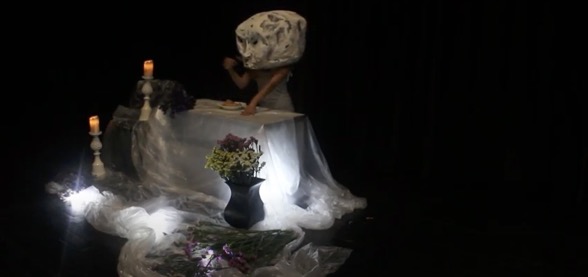
Opera as a Collaborative and Intermedial Art Practice
As opera integrates the storytelling strategies of theatre in music, it is inherently an 'Intermedial' Art. Evolutions both in the field of music as in the field of Theatre, infect its practice profoundly. New trends and technologies are imported and exported across these art borders. This perpetual infection keeps Opera at the forefront of the Arts. Its is not a re-enactment of a past long gone, it is a vibrant, contemporary art practice.This entanglement with the other arts requires collaboration between artists and technicians of these arts. It is a profoundly collaborative practice. This is not always reflected in the Opera Education. Too often, education is organised as if opera was just music, or as an entirely autonomous art form. This does not reflect the rich practice in daily life.
Collaboration with all its composing art forms is also for opera education a necessity if it wants to prepare singers and composers (and conductors and even musicians) for the real world outside.
* More cooperation with the other art forms involved
A close collaboration with acting departments and/or schools in the vicinity is a first step into linking opera to its collaborating art forms, within education. These collaborations sound obvious but are sometimes far from that. Differences in approaches and styles are some times quite hard to surpass. But as 'good' acting - in different styles - becomes a vital quality for every opera singer, incorporating best practices from neighbouring acting classes is a must.In a more ambitious approach, collaborations with very different art studies - fine arts, media art… - should be stimulated, if only at a student level. Providing practical support for such spontaneous collaborations could make the difference. Organising lectures from artists from different art practices - somehow linked to opera - are an easy way to open the peripheral view of the opera students. Opera is not just singing music: it's a collaborative art.
* Getting to know the other arts and artists
A better knowledge of the composing arts of opera (music, theatre and fine arts) will help the future collaborations of singers with directors, scenographers etc. Building a network with aspiring opera directors and set designers. Integrating rudimentary lessons on contemporary fine and performative arts within the regular curriculum of all opera singers. Providing the possibility to follow classes (or even full blown minors) in neighbouring arts.If one contemplates the history of opera creation and opera stagings, it is a history of close collaborations between artists of different arts. These relations often start at the Higher education level: young artists meeting each other in classes, learning to appreciate their different practices. These collaborations are often at the hearth of opera renewal.
* A new profile for an open minded (highly skilled) singer, open to co-creation and collaboration
In selecting and educating opera students, the changing social status of opera should be kept in mind. Creating a wider diversity on all levels is the responsibility of each Higher opera Education Institute too. As the ways of working evolve in the opera practice, more collaborative skills and an open mind towards concretion are needed. This quintessential, if only to assure the survival of opera in the ever changing structure of society. This requires new social skills which can and should be trained in regular opera education.
Opera, by its textual nature, addresses themes of contemporaneity and as it did in the past (just consider, for instance, Mozart’s Don Giovanni, Puccini’s La Bohème or Verdi ́s Otello) and share its critical lens over society. “Culture and society can only benefit from that”. This new profile might also provide a higher level of artistic singularity and create a space for the singer/artist bigger than only his/her voice.
Bruno Pereira and António Salgado (ESMAE Porto)
A new singer’s profile
New and open Profiles “The socio-cultural, artistic and also economic context have been playing an important role in the gradual transformation of Opera, allowing and obliging many singers, opera composers and opera students, generally speaking, to choose, beyond the traditional circuit, an alternative circuit to the field of opera which demands the choice of new ways of relating to the practice of collaborative and co-creative work around the Opera and the Music Theatre. This need for a more flexible and open profile of a singer, and opera students, may create proactive and attentive professionals to the reality that surrounds them. In this sense, opera may turn into this new artistic and cultural performance practice process which allows it to become intrinsically significant in the communities’ history and also in the audiences’ development.”
António Salgado (ESMAE Porto)

